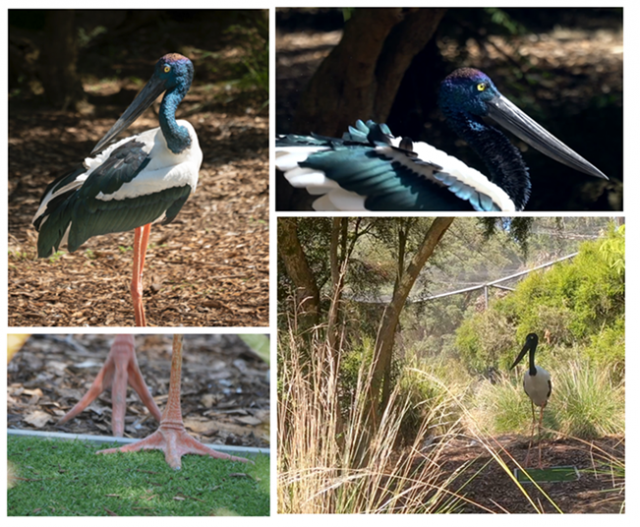
Making a small step up onto scales using its long legs may look easy for Healesville Sanctuary’s giant Black-necked Stork, but it’s a huge step in the bird’s ongoing health care.
The long-legged, lean bird has been working with keepers for 12 months, building up her confidence to the point where she is now choosing to weigh herself.
Monitoring weight provides valuable information for keepers caring for many different species as a sudden weight loss or weight gain can be indicative of underlying health or diet issues.
Healesville Sanctuary Bird Keeper Jesse Smith said training Jardine was challenging but rewarding.
“The first step was to put food items she had shown a preference for eating around a piece of artificial turf, this ensures the bird is comfortable with the feeling of walking on the material and associating it with lots of nice things,” Ms Smith said.
This is an important part of training with positive reinforcement.
“Training was challenging at first because the stork steps very slowly, almost at a stalking pace.” Ms Smith said.
As the stork gained confidence, a scale was placed underneath the turf with a platform for her to stand on.
During each training session, the stork is able to choose whether she wants to participate.
At her most recent weigh-in, the stork tipped the scales at a healthy 4.44 kilograms.
Rather than vocalising to communicate, Black-necked Storks will make clapping noises with their beaks and raise their wings.
The stork at Healesville Sanctuary sometimes does this behaviour when keepers approach with fresh fish for a training session.
Black-necked Storks can be found in coastal and wetland areas of north and eastern Australia.
According to the International Union for Conservation of Nature Red List of Threatened Species, Black-necked Storks are listed as ‘Near Threatened’ with a decreasing population. Threats to this species in the wild include loss of habitat due to agriculture and aquaculture, pollution, and climate change.
Visitors can see the Black-necked Stork on the Wetlands track at Healesville Sanctuary along with 11 other bird species, including the Australian blue-bill duck, Blue-winged kookaburra, Little pied cormorant, Royal spoonbill, and White-face heron to name a few.
Zoos Victoria and Healesville Sanctuary visitors are reminded that all tickets must be pre-booked online at zoo.org.au.
Zoos Victoria Members no longer need to book but are required to scan their Membership card to gain
entry.






